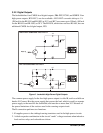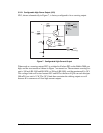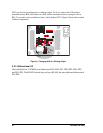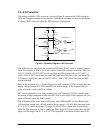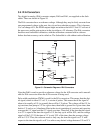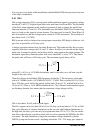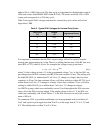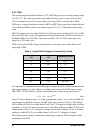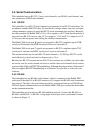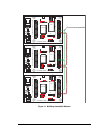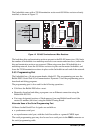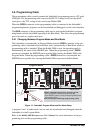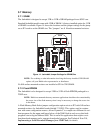
26 Jackrabbit (BL1800)
3.4.2 DA0
The op amp supporting DA0 translates a 12%–88% duty cycle to an analog voltage range
of 0 V to 3 V. The software operates only within this duty cycle; a duty cycle less than
12% is rounded down to 0%, and any duty cycle above 88% is rounded up to 100%.
DA0 uses a voltage divider that consists of R21 and R27 and a gain-offset circuit that con-
sists of R26 and R29 to achieve the output range of 0 V to 3 V within the software duty
cycle.
The DA0 output can be less than 100 mV for a 0% duty cycle and above 3.0 V for a 100%
duty cycle. The duty cycle is programmed as the high-time count of 1024 total counts of
the Rabbit 2000’s timer B. Thus, 256 counts would be 25% of 1024 counts, and corre-
sponds to a 25% duty cycle.
Table 3 lists typical DA0 voltages measured for various duty cycle values with a load
larger than 1 MΩ.
It is important to remember that the DA0 output voltage will not be realized instantaneously
after programming in a value. There is a settling time because of the RC time constant
(R21 || R27 × C20), which is 7.68 ms. For example, the voltage at any given time is
V = V
P
– (V
P
– V
DA0
)e
(-t/RC)
(EQ 2)
where V is the voltage at time t, V
P
is the programmed voltage, V
DA0
is the last DA0 out-
put voltage from the D/A converter, and RC is the time constant (7.68 ms). The settling
will be within 99.326% (or within about 21 mV for a 3 V change in voltage) after five time
constants, or 38 ms. Six time constants, 46 ms, will allow settling to within 99.75% (or to
within about 8 mV for a 3 V change in voltage). Seven time constants, 54 ms, will allow
settling to within 99.91% (or to within about 3 mV for a 3 V change in voltage).
The settling time is reduced somewhat by precharging capacitor C20 with pulse-width
modulation from PD2.
Table 3. Typical DA0 Voltages for Various Duty Cycles
Duty Cycle
(%)
Voltage
(V)
Programmed Count
0 0.074 0–122
12 0.076 123
25 0.530 256
50 1.467 512
75 2.406 768
88 2.875 901
100 3.345 902–1024



